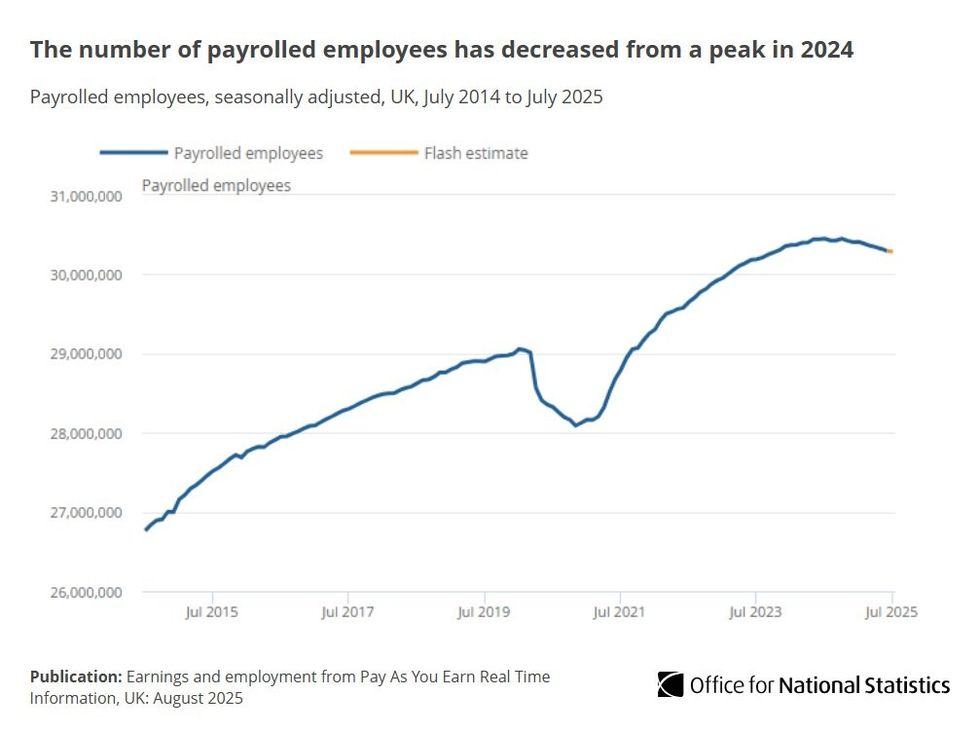Britons turn to 'job hugging' as security trumps ambition in UK job market

Jeremy Hunt says Rachel Reeves will have to put up taxes in autumn budget |
GB News

Workers prioritise job security over career moves amid tax-driven uncertainty
Don't Miss
Most Read
Latest
New data reveals a growing trend of "job hugging" as British employees cling to stability in an uncertain market.
Experts warn that fiscal policy changes are reshaping career decisions across the nation.
British employees are increasingly choosing job stability rather than pursuing career advancement, new research reveals.
This represents a marked shift in workplace attitudes since the autumn budget announcement last year.
The phenomenon, dubbed "job hugging" by industry experts, has emerged as workers hold tightly to their existing positions. Employment opportunities have become scarcer and rivalry for available roles has grown more intense.
Fresh analysis indicates that confidence in Britain's employment market has notably diminished. The data was compiled from approximately 350,000 small and medium enterprises.
The figures show how tax policy changes have fundamentally altered worker behaviour across the nation. Employees now view their current positions as safe harbours in an increasingly uncertain economic landscape.
The employment landscape experienced a sharp contraction following the budget announcement. December 2024 witnessed a 0.9 per cent drop in employment compared to November.
This decline proved particularly striking as it contradicted the typical seasonal pattern of increased hiring. Retail and hospitality sectors traditionally expand their workforce to meet festive demand.

New data reveals a growing trend of "job hugging" as British employees cling to stability in an uncertain market.
|PA/Getty
Do you have a money story you’d like to share? Get in touch by emailing money@gbnews.uk.
The downturn followed the Chancellor's revelation of plans to increase employer national insurance contributions.
The change is scheduled to take effect from April. This tax rise on businesses created immediate uncertainty in the labour market.
Companies began to reassess their hiring strategies and workforce requirements. The timing of the announcement appears to have disrupted the usual year-end recruitment surge.
It marked an unusual departure from established employment patterns.
Employment figures began recovering from February 2025, July recorded a 1.7 per cent monthly increase in hiring activity.
Yet this apparent improvement masks a deeper concern about the market's overall health. with annual growth for July measured less than half the rate recorded twelve months earlier.

Career ambition has dwindled.
| GETTY IMAGESThe data reveals a fundamental deceleration in Britain's job market throughout the past year, which has persisted despite the recent monthly improvements.
HR platform Employment Hero conducted the analysis which tracked average workforce numbers across thousands of businesses to identify these trends.
The contrast between modest monthly gains and significantly reduced annual growth rates is striking. It suggests that whilst immediate hiring freezes have eased, employers remain cautious.
Many firms are reluctant to expand their workforces to pre-budget levels.
A comprehensive survey reveals that 55 per cent of British workers are now prioritising employment security, a cautious approach proves particularly pronounced amongst younger professionals.
65 per cent of those between 18 and 34 years old expressed preference for stability over advancement. The same demographic faces heightened pressure in the current market, with 53 per cent of young workers report excessive competition for available positions.
Kevin Fitzgerald, Employment Hero's UK managing director, said: "This 'job hugging' trend reflects employees attempting to weather the storm in challenging conditions."
Major corporations are already adapting to this shift.
Lloyds recently announced efforts to cultivate a "high-performance culture" aimed at improving productivity. The bank also hopes to address reduced staff turnover as employees remain in their positions longer.
LATEST DEVELOPMENTS:
 Payrolled employment decreased by 8,000 employees in July 2025, compared with June 2025 | ONS
Payrolled employment decreased by 8,000 employees in July 2025, compared with June 2025 | ONSFitzgerald warned: "The rise in employer national insurance contributions has had a ripple effect right across the economy, and we're now at a critical juncture."
He added: "Preventing additional tax changes that might provoke knee-jerk reactions from businesses will prove essential for sustaining early recovery signs as the autumn Budget approaches."
Nina Skero, chief executive of the Centre for Economics and Business Research, highlighted another concern.
She said: "Workers are facing a difficult balancing act while pay growth remains strong, inflation continues to eat into real wages, and job opportunities are thinning out."
These expert assessments underscore the profound impact of fiscal policy on employment dynamics.
They also highlight shifting worker psychology across Britain.
More From GB News










